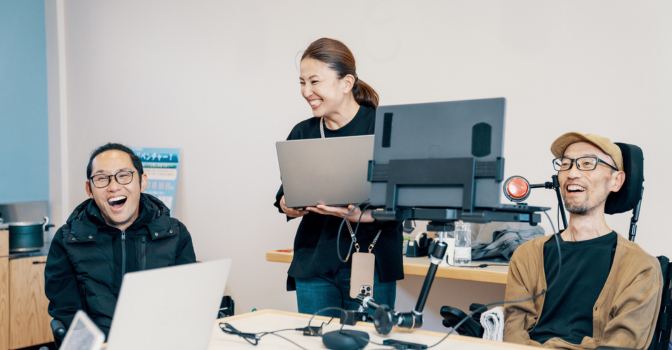Remarkable began in 2016 as an initiative of the Cerebral Palsy Alliance (CPA). It was inspired by global competitions led by CPA, where individuals with cerebral palsy helped drive the creation of technologies like a solar-powered wheelchair. A hackathon inviting people with disability to build cutting-edge solutions also sparked Remarkable’s journey. Since then, the program has grown into a variety of startup acceleration initiatives, including a fellowship for entrepreneurs with disability, podcasts, industry events, and a thriving global network.
Harnessing technology for inclusion.
The mission of Remarkable is simple: to improve lives through technology designed for and with people with disability. Innovation and tech have long been driven by the needs of the disability community. Many of the tools we rely on today, like speech-to-text, keyboards, and captions, were born from this space. The typewriter? Invented to help a blind person write legibly. Texting? Created to allow deaf and hard of hearing people to communicate. Audiobooks? First developed for blind readers.
A history of innovation.
Remarkable’s early days weren’t without challenges. While investors showed interest, much of it felt patronising – more focused on inspiration than recognising the market potential. Yet, the disability community has always been a source of innovation, from robotics to brain-computer interfaces. Some early self-driving car concepts even originated from powered wheelchair technology.
And this is just the beginning.
The untapped market.
Globally, between 1.3 and 2 billion people live with disability – representing one in six people. Known as the “largest global minority,” this community is often overlooked in business. However:
- People with disability, along with family and friends, control $13 trillion in global spending annually – more than twice the size of the ecommerce market.
- Exclusion from the workforce leaves a $2 trillion gap in global GDP.
- In low and middle-income countries, fewer than 3% of people needing assistive technology can access it.
Real stories of change.
Remarkable’s work is not just about funding but about meaningful change. Take Alper, a man from Turkey who needed a solar-powered wheelchair to access a local temple and job opportunities. With Remarkable’s help, he partnered with the University of Virginia to develop a custom solar-powered wheelchair. It may not have been the prettiest design, but it worked. Alper regained his independence, found a job, and changed his life.
So far, Remarkable has supported around 130 companies, helping them grow from early-stage concepts to market-ready solutions. Collectively, these startups have improved the lives of more than 300,000 people worldwide.
Building the future.
Remarkable’s founder, Pete Horsley, has a personal connection to the work. Inspired by his sister Jo, who is autistic, blind, and has an intellectual disability, Pete’s mission is to build a world where inclusion is the norm.
“Growing up with Jo showed me the world wasn’t built for her or people like her,” Pete says. “But Jo is incredible – she has perfect pitch and can name every song on hundreds of albums. Most people don’t see her strengths. But we can change that.
“By including people with disability in innovation, we unlock talent and create better technology. Tech is the future, and we have a responsibility to ensure it benefits everyone.”
It’s time to embrace change.
Technology can do more than connect us – it can change lives. When people with disability are part of the process from the beginning, we don’t just do good; we create better solutions for everyone.

